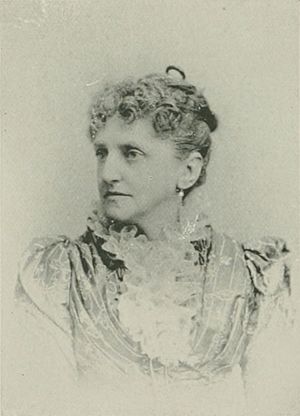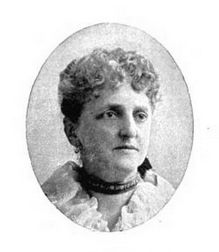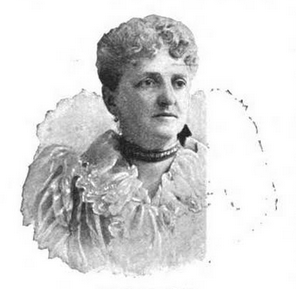Lillie Devereux Blake facts for kids
Quick facts for kids
Lillie Devereux Blake
|
|
|---|---|

a "Woman of the Century"
|
|
| Born | Elizabeth Johnson Devereux August 12, 1833 Raleigh, North Carolina |
| Died | December 30, 1913 (aged 80) Englewood, New Jersey |
| Pen name | Tiger Lily |
| Occupation | writer, reformer, suffragist |
| Language | English |
| Nationality | American |
| Alma mater | Miss Apthorp's School for Girls |
| Spouse |
Frank Geoffrey Quay Umsted
(m. 1855; died 1859)Grinfill Blake
(m. 1866) |
| Children | Katherine Devereux Blake |
| Relatives | William Samuel Johnson, Samuel Johnson, Jonathan Edwards |
| Signature | |
Lillie Devereux Blake (also known by her pen name, Tiger Lily) was an important American writer and reformer. She was born on August 12, 1833, in Raleigh, North Carolina. Lillie was a strong supporter of women's suffrage, which means she fought for women's right to vote. She also worked to improve many other areas of life for women.
In her early years, Lillie wrote several novels and articles for newspapers. By 1869, she became very active in the women's suffrage movement. She organized meetings, wrote articles, and gave speeches to promote equal rights. Even with her public work, she always made sure to take care of her family. In 1872, she wrote a novel called Fettered for Life, which showed the many challenges women faced. She also pushed for Columbia College to allow young women to study there, which helped lead to the creation of Barnard College.
A Champion for Women's Rights
Lillie Devereux Blake was a tireless advocate for women. She worked hard to change laws and public opinion.
Leading the Suffrage Movement
In 1879, Lillie was chosen to be the president of the New York State Woman's Suffrage Association. She held this important role for eleven years. Every summer, she traveled around New York State, organizing meetings and working to pass new laws. She often spoke to lawmakers, explaining why women should have more rights.
Thanks to her efforts, a law was passed in 1880 that allowed women to vote in school elections. Each year, she helped introduce bills to give women more voting rights. In 1883, a religious leader named Morgan Dix gave speeches saying women should only focus on traditional duties. Lillie bravely responded to each of his talks, arguing for more modern ideas about women's roles. Her speeches were published as "Woman's Place To-day" and were very popular.
Other Important Reforms
Lillie also worked on many other important reforms. She fought to have women called "matrons" in police stations to help women who were arrested. She started speaking about this in 1871. Even though it took many years, a law was finally passed in 1891 to make this happen.
In 1880, Lillie was the first to suggest that women should be hired as census takers. She also helped pass laws that required stores to provide seats for saleswomen. She pushed for women doctors to be present in hospitals where women were treated. Many other helpful laws were proposed or supported by her.
From 1886 to 1900, Lillie was the president of the New York City Woman Suffrage League. She traveled across the United States, giving speeches and meeting with lawmakers in Congress and state legislatures. She also continued her writing. People remembered her as a smart writer, a witty speaker, and a wonderful host. Her weekly gatherings in New York were popular among writers and reformers.
Early Life and Education
Lillie Devereux Blake was born Elizabeth Johnson Devereux in Raleigh, North Carolina. Her father was George Pollok Devereux, a wealthy plantation owner. Her mother was Sarah Elizabeth Johnson. Lillie's family had important ancestors, including early governors and presidents of Columbia University.
Lillie spent much of her childhood in Roanoke, Virginia. Her father called her "Lilly," a name she later used. After her father died in 1837, her mother and sisters moved to New Haven, Connecticut. There, her mother was known for her generous hospitality at their home, "Maple Cottage."
Lillie went to Miss Apthorp's School for Girls in New Haven. She also studied at home with tutors, following the Yale College course. Even as a teenager, Lillie was very popular and wanted to challenge the unfair rules for women. When she was young, a student at Yale was expelled because he spread false rumors about her after she turned down his romantic interest. Lillie later wrote that she regretted the student's expulsion and that the rumors did not harm her reputation.
Her Career
Lillie Devereux Blake had a busy career as a writer and activist.
As a Writer
In 1855, Lillie married Frank Geoffrey Quay Umsted, a lawyer. They lived in St. Louis, Missouri and New York City. Her two daughters, Elizabeth and Katherine, were born in 1857 and 1858. Sadly, Mr. Umsted died in 1859, leaving Lillie to support her children.
She had already started writing, with her first story, "A Lonely House," appearing in Atlantic Monthly. She also published a successful novel called Southwold in 1859. Since her family's money was largely gone, Lillie began to work seriously. She wrote stories, articles, and letters for many popular magazines. She lived mostly with her mother in Stratford, Connecticut, but also spent winters in Washington, D.C. and New York. In 1862, she published another novel, Rockford.
What brought Lillie the most money and fame was her work as a correspondent during the American Civil War. She wrote detailed and exciting accounts of the war for several newspapers, including the New York Evening Post and the New York World. Her reports were highly praised. She even met President Abraham Lincoln, President Andrew Johnson, and General Ulysses S. Grant at the White House.
Lillie's early stories often featured strong female characters. Her later writings, especially her journalism, became more realistic and focused on women's issues. Her most famous novel, Fettered for Life, or, Lord and Master: A Story of To-Day, aimed to highlight the many problems women faced.
Lillie also wrote non-fiction books like Woman's Place To-day (1883) and A Daring Experiment (1894). She even shared a recipe for "Last Century Blackberry Pudding" in The Women Suffrage Cookbook, showing her interest in traditional feminine pursuits alongside her activism.
The Melissa Story
In 1858, Lillie wrote a fictional story for The Knickerbocker magazine about a woman named Melissa. In the story, Melissa murders her tutor by leaving him in a cave without a lamp. Fifteen years later, Melissa returns to the cave to end her own life.
Some people who believe in ghosts have used this story to explain strange sounds in caves. They claim to hear Melissa weeping or calling out. However, researchers like Joe Nickell explain that hearing sounds in caves and interpreting them as words is a common trick of the brain, called pareidolia. Lillie likely did not intend to create a ghost story. Over the years, the story was changed, adding details like Melissa dying of tuberculosis, which led to claims of hearing coughing in the cave. While Melissa is a fictional character, Lillie did visit Mammoth Cave with her first husband.
Marriage and Continued Activism
In 1866, Lillie married Grinfill Blake, a wealthy merchant from New York. She then made New York City her home.
Lillie spoke before the New York Constitutional Commission of 1873 to support women's right to vote. She also signed the 1876 Centennial Women's Rights Declaration. She led the New York State Woman's Suffrage Association for many years.
Lillie eventually disagreed with the National American Woman Suffrage Association. She believed the women's movement should work on many reforms, not just voting rights. She thought that gender roles were learned, and that women and men were similar and should have the same rights. Other leaders, like Susan B. Anthony, focused more on women's unique qualities as a reason for their right to vote. This difference in ideas helps explain why Lillie's contributions are sometimes less remembered.
National Legislative League
After leaving the larger suffrage organization, Lillie created the National Legislative League. She worked to improve immigration laws for women. She also helped Civil War nurses get pensions. Lillie fought for mothers to have equal custody of their children. She encouraged women to get involved in public life and study law.
Push for Co-education
Lillie was a key supporter of the movement that led to the creation of Barnard College. In 1869, she began speaking across the United States to support women's right to vote. She became known as a "freethinker" because she challenged traditional ideas. She gained fame when she criticized the well-known speeches of Morgan Dix, a clergyman who said the Bible proved women were inferior. Lillie's lectures, published as Woman's Place To-Day, rejected this idea. She famously argued that if Eve was inferior to Adam because she was created after him, then Adam must be inferior to fish!
P.S. 6 on the Upper East Side of Manhattan is named after her.
Images for kids
See also
 In Spanish: Lillie Devereux Blake para niños
In Spanish: Lillie Devereux Blake para niños
 | Victor J. Glover |
 | Yvonne Cagle |
 | Jeanette Epps |
 | Bernard A. Harris Jr. |



